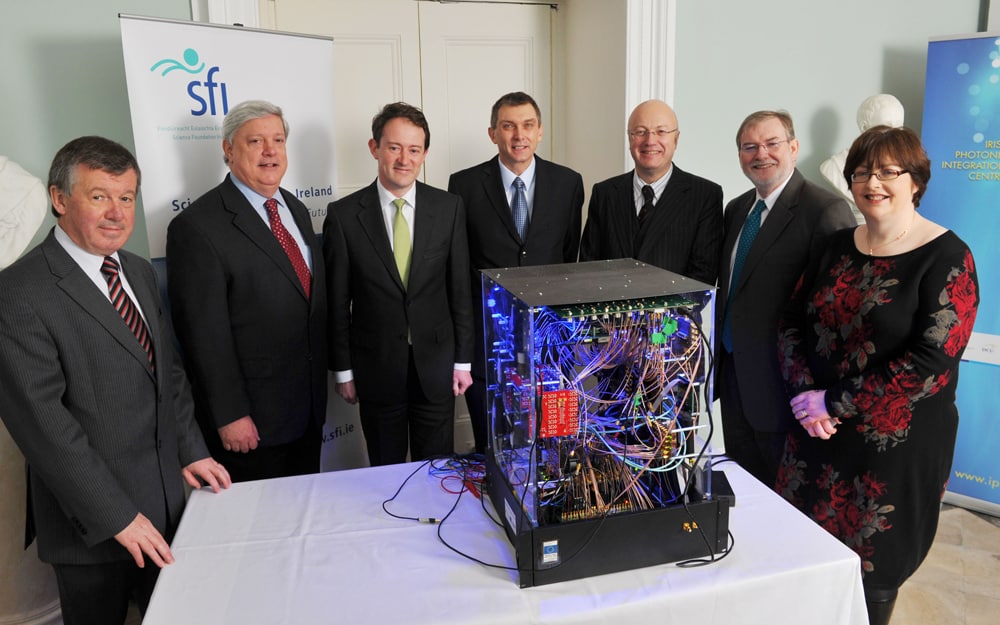The Minister for Research and Innovation, Sean Sherlock TD, today launched a new €30mn Irish Photonic Integration Centre (IPIC) led by Tyndall National Institute in collaboration with UCC, CIT and DCU.
The new SFI Research Centre brings together over 100 researchers from the four institutes to develop new light-enabled technologies. The team will work with 18 industry partners including multinationals, Irish SMEs and high-tech start-ups.
The centre will receive €20mn from the Department of Jobs, Enterprise and Innovation through SFI’s Research Centres Programme, with an additional €10mn leveraged from industry. It will also act as a high-tech start-up base, with new high-tech company, X-Celeprint already committed to base its headquarters in Tyndall and to create up to 20 jobs in the next two years.
Speaking at the IPIC launch, Minister Sherlock said: “This investment of €20mn of taxpayers’ money, with an additional €10mn from industry, is further proof of the Government’s commitment to Irish research. IPIC represents one of the strongest research teams in Europe. The centre is in prime position to achieve further funding from the Horizon 2020 funding round and to attract new companies and talent to Ireland.”
The Minister continued:”Tyndall has an impressive and diverse industry partner list, including Intel, Stryker and X-Celeprint.”
The Minister also welcomed the potential benefits resulting from IPIC’s research, which include the prospects of stimulating the creation of 200 new jobs in the key ICT and medical device sectors over the next six years.
Targeting the ICT and medical devices sectors, IPIC will work with industry to develop the next generation of highly-compact and miniaturised photonic technologies. Over the next six years, the Centre has ambitious plans to catalyse the creation of 200 new jobs through 30 research projects and the commercialisation of new photonic technologies. The Centre’s work will focus on revolutionising the speed of data transfer, creating more energy efficient devices and delivering new smart medical devices for improved diagnosis and treatment of disease.
Explaining the decision to locate at Tyndall and partner with IPIC, X-Celeprint CEO, Kyle Benkendorfer, said: “The decision to set up our headquarters in Ireland was an easy one based on Tyndall’s synergistic work environment and the unique research and commercialisation opportunities offered by IPIC through its relationships with renowned international technology companies. We look forward to developing our business and recruiting up to 20 new employees in the coming years and would encourage other companies to consider joining this collaborative ecosystem.”
Outlining the vision for IPIC, Paul Townsend, IPIC director, said: “The launch of IPIC represents an exciting new chapter in photonic research in Ireland, which aims to achieve both measurable economic impact and global scientific recognition for Ireland in this sector. The centre brings together a full research ‘value chain’ with expertise that spans from semiconductor and bio-materials, through integrated photonic and microelectronic circuits, to fully-packaged photonic systems. As a result, IPIC will be uniquely placed to drive new advances in photonic science and technology and to harness these innovations to solve some of the key challenges facing our industry partners.”
Professor Mark Ferguson, director general of SFI and chief scientific adviser to the Irish Government added: “The launch of this new centre is an important development as both of the major sectors it will support are showing significant growth in Ireland. This is an excellent example of the kind of collaboration between industry and academia that we will continue to encourage: excellent science with impact. IPIC’s collaboration with X-Celeprint demonstrates the importance of continuing to strengthen the links between academia and industry in a way that supports innovation and the creation of important new jobs and enterprise. I am confident that this new centre, IPIC will contribute to future growth in jobs and prosperity, that it will highlight the cutting edge academic and commercial research talent in Ireland and Ireland’s share of the global photonics market will increase.”

